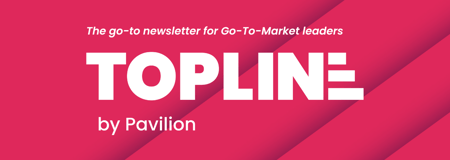


This editorial appeared in the April 3rd, 2025, issue of the Topline newsletter.
Want all of the latest go-to-market insights? Subscribe to Topline and get the full newsletter delivered to your inbox every Thursday.
For a generation, "learn to code" was the career advice that couldn't miss. Parents whispered it to children. Teachers preached it in classrooms. A direct pipeline to six figures and job security in an uncertain world. Now, that’s the advice “we used to give.”
Replit CEO Amjad Masad delivered the wake-up call: learn to think, not code. Why? Because we're barreling toward a world of "vibe-coding"—a revolution coined by AI pioneer Andrej Karpathy where we'll build software through natural language, not manual programming. The days of semicolons and brackets are numbered.
"See stuff, say stuff, run stuff" isn't some distant utopia reserved for sci-fi novels. It's already here, with adoption curves that could make crypto blush. GitHub Copilot has blown past 1M paying users. Cursor has rocketed to 350K. The trajectory is unmistakable—even if total coding democratization remains a few years out.
For students mapping career paths, engineers recalibrating their futures, or professionals desperately seeking relevance in the AI age, the message is clear: thinking—with clarity, creativity, and originality—is the new coding.
Which begs the trillion-dollar question: how exactly does one learn to think?
Fortunately, answering this question is much easier than defining "thinking."
From 30,000 feet, the view is impressive. Humans have roamed Earth for about 200,000 years, and by almost any measure, today is the best time to be alive. We live longer, healthier, safer lives than any previous generation—direct dividends from centuries of great thinking (and doing). But zoom in, and the picture gets complicated.
For decades, we were on a cognitive hot streak. Throughout most of the 20th century and into the 2000s, human IQ scores climbed steadily—a 2023 meta-analysis found an average jump of roughly 30 points between 1948 and 2020. We've also gotten sharper at short-term memory tasks and spatial reasoning puzzles too.
Digital technology has supercharged certain mental functions. Offloading information to our devices increased recall by 18% to 27% in experimental settings. A 2023 study of 18,154 adults found that regular internet users had 50% less risk of developing dementia than those who stayed offline.
But technology's cognitive gifts come with hidden costs. While we now primarily read on screens, a 2023 study found that those reading on paper had 6-8X better comprehension, while digital reading showed no such benefits. Even more troubling: a 2024 study revealed a 10-15% decline in critical thinking and problem-solving compared to just 30 years ago, alongside significant drops in creativity, attention spans, and prospective memory.
The irony cuts deep. We're collectively smarter than we've ever been, with technology making us more capable than previous generations could have imagined—yet that same technology is actively eroding the very thinking skills we'll need most in an AI-dominated world. Our cognitive bank account shows record deposits alongside alarming withdrawals.
We're entering a world where AI handles all the mundane, monotonous tasks that fill our workdays—doing them better, faster, and more consistently than we ever could. Our value won't come from competing with AI, but from orchestrating it to achieve outcomes that matter. For that, we need to think exceptionally well.
So how do we sharpen our thinking in this new landscape? The prescription is deceptively simple, yet profoundly difficult to implement:
I don't know about you, but most of these sound like "someday" activities to me—things I'd love to do more of, but never seem to have time for. There are more important things to focus on today, I tell myself. I'll have plenty of time for deep reading and creative thinking once I've "won" (whatever that means).
But that's precisely the trap. In this new world, these aren't luxury activities—they're survival skills. They're what will separate those who merely use AI from those who orchestrate it masterfully. While we delay, someone is already developing these thinking abilities who will run circles around everyone else.
The question isn't whether AI will transform your work—it's whether you'll be ready when it does. And as we stand at this inflection point in human history, there's really only one question that matters: will that someone be you?

Asad is CEO of Sales Talent Agency and Editor of Topline Newsletter. Sales Talent Agency has helped over 1,500 companies hire CROs, BDRs, and everything in between and facilitated $1B+ in compensation.

